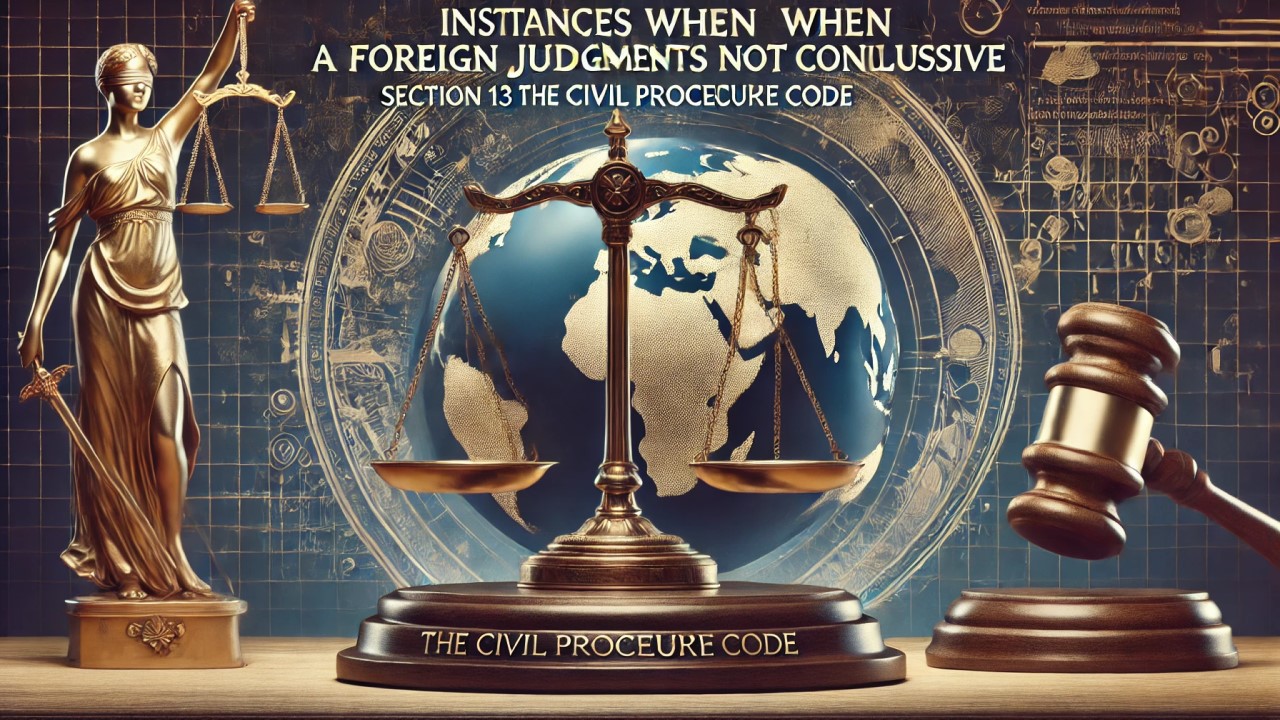Instances When a Foreign Judgment Is Not Conclusive – Section 13 of the Code of Civil Procedure, 1908, outlines the conditions under which a foreign judgment is not considered conclusive. It specifies that a foreign judgment will not be deemed final and binding in the following situations:
- If the judgment was not delivered by a court of competent jurisdiction. This means the foreign court must have had the authority to hear and decide the case.
- If the judgment was not given based on the merits of the case. This implies the foreign court must have evaluated the evidence and arguments from both sides before reaching a decision.
- If the judgment is based on an incorrect interpretation of international law or fails to recognize Indian law where applicable. The foreign court must have applied the law correctly and acknowledged Indian law when relevant.
- If the proceedings leading to the judgment were contrary to natural justice. This means the foreign court must have conducted the proceedings in a fair and impartial manner.
- If the judgment was obtained through fraud. The foreign judgment must not have been secured by deception or misrepresentation.
- If the judgment is based on a claim that violates any law in force in India. The foreign judgment cannot be enforced if it supports a claim that is illegal under Indian law.
If a foreign judgment is not conclusive under Section 13 of the CPC, it can be challenged in an Indian court. The court will then decide whether to enforce the foreign judgment or not. Below are some examples of situations where Section 13 of the CPC—When Foreign Judgment Not Conclusive—would apply:
- A foreign court issues a judgment in favor of a plaintiff without properly serving the defendant with notice of the proceedings.
- A foreign court delivers a judgment on a matter that falls outside its jurisdiction.
- A foreign court passes a judgment that is based on a violation of Indian law.
- A foreign judgment is obtained through fraud.
Here are some case laws related to situations where Section 13 of the CPC applies:
Case law on lack of competent jurisdiction:
- Mohan Lal v. State of Rajasthan (1979 AIR 1861): The Supreme Court held that a foreign judgment is not conclusive if the foreign court lacked competent jurisdiction to hear the case.
- Transasia Engineering Co. Ltd. v. Indian Oil Corporation Ltd. (2023 SCC Online Del 862): The Delhi High Court ruled that a foreign judgment is not conclusive if the foreign court did not have personal jurisdiction over the defendant.
Case law on lack of adjudication on merits:
- Brijal Ramjidas v. Govindram Gordhandas Seksaria (1968 AIR 1209): The Supreme Court held that a foreign judgment is not conclusive if the foreign court did not adjudicate on the merits of the case.
- D. Viswanathan v. The Corporation Bank (2008 SCC Online Mad 1231): The Madras High Court held that a foreign judgment is not conclusive if the foreign court issued a preliminary decree without deciding on the merits of the case.
Case law on incorrect application of international or Indian law:
- Shankarlal v. State of Gujarat (1986 AIR 1291): The Supreme Court ruled that a foreign judgment is not conclusive if the foreign court applied an incorrect interpretation of international or Indian law.
- Indian Oil Corporation Ltd. v. ONGC Petro Additions Ltd. (2005 AIR 2365): The Supreme Court held that a foreign judgment is not conclusive if the foreign court refused to recognize valid Indian law.
Case law on proceedings opposed to natural justice:
- State of Rajasthan v. Mohan Lal (1979 AIR 1861): The Supreme Court held that a foreign judgment is not conclusive if the foreign court did not conduct the proceedings fairly and impartially.
- UCO Bank v. Dinesh Engineering Works (2010 AIR 2578): The Supreme Court ruled that a foreign judgment is not conclusive if the defendant was not given adequate notice of the proceedings.
Case law on fraud:
- Shankarlal v. State of Gujarat (1986 AIR 1291): The Supreme Court held that a foreign judgment is not conclusive if it was obtained by fraud.
- Indian Oil Corporation Ltd. v. ONGC Petro Additions Ltd. (2005 AIR 2365): The Supreme Court ruled that a foreign judgment is not conclusive if the plaintiff obtained the judgment through misrepresentation.
Case law on breach of Indian law:
- UCO Bank v. Dinesh Engineering Works (2010 AIR 2578): The Supreme Court held that a foreign judgment is not conclusive if it is based on a claim that is illegal under Indian law.
- Transasia Engineering Co. Ltd. v. Indian Oil Corporation Ltd. (2023 SCC Online Del 862): The Delhi High Court ruled that a foreign judgment is not conclusive if it is based on a breach of a fundamental right guaranteed by the Indian Constitution.
These are just a few examples of case laws regarding the circumstances where Section 13 of the CPC applies to foreign judgments. It’s important to note that the law in this area is complex, and courts consider various factors when determining whether to enforce a foreign judgment. If you’re considering enforcing a foreign judgment in India, it is advisable to consult a lawyer to ensure the judgment is conclusive and enforceable under Indian law.
